

Tags
Abortion
asylum
Biden
big beautiful bill
confirmation bias
conflicts of interest
coronavirus
corruption
deep state
Democracy
deregulation
Donald Trump
election
Elon Musk
e pluribus unum
ethics
fascism
First Amendment
freedom
Free Speech
GOP
Hate speech
Humanitarian law
January 6
JFK Assasination
lies
Love
Morals
Musk
nepotism
Pizzagate
Politics
public health
Putin
QAnon
rich vs. poor
Russia
Social media
Steven Miller
Supreme Court
Trump
Ukraine whistleblower
Warren Buffett
witch hunt
Zuckerberg